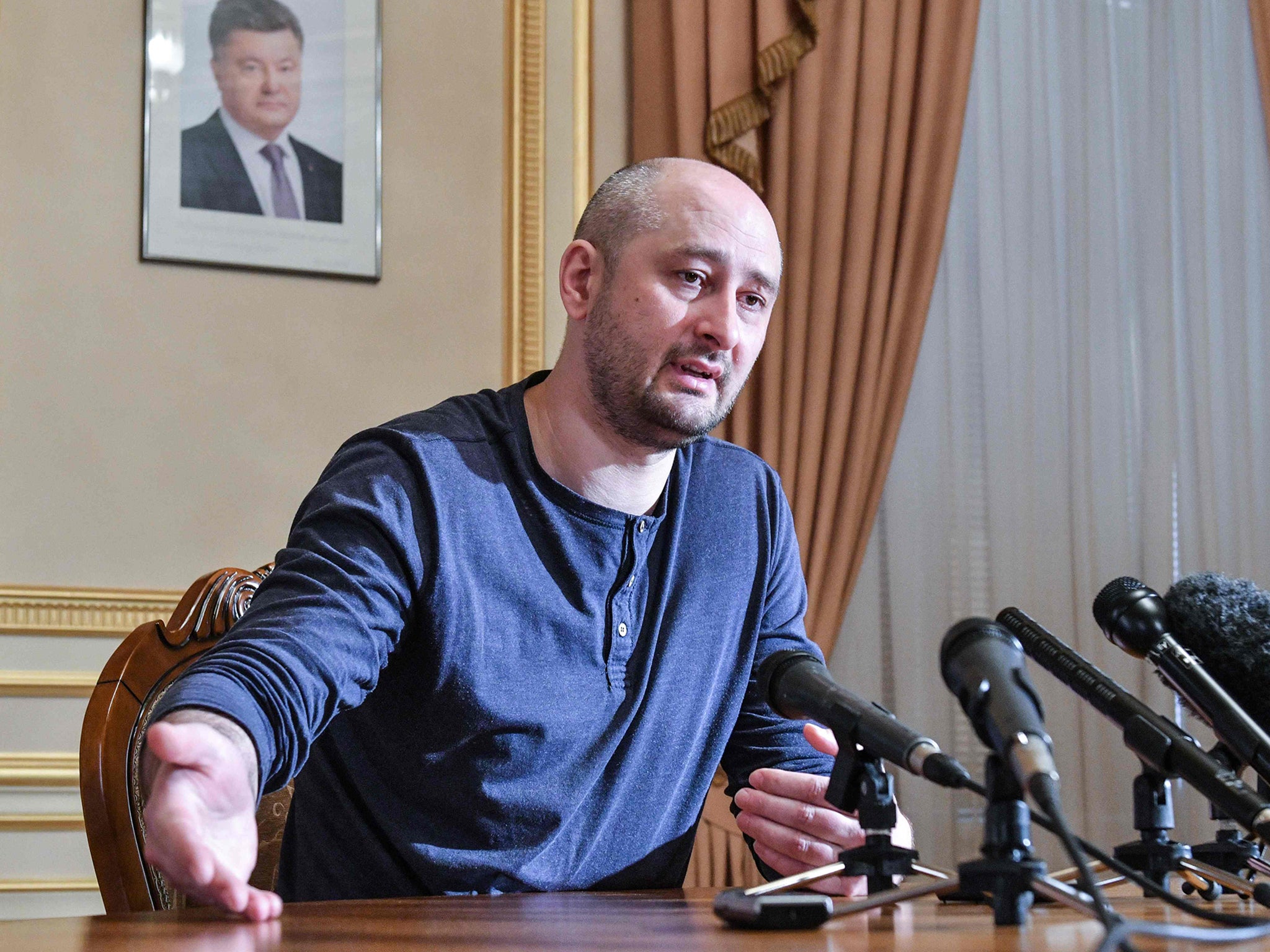Faked 'murder' of Russian journalist divides colleagues and leaves many unanswered questions
'This story has been a victory of the post-factual world and it makes our jobs even more difficult,' says one Russian journalist

A day after returning from the dead, journalist Arkady Babchenko voiced what many had been thinking about the strange operation in which Ukrainian security services (SBU) faked his death.
“Perhaps it could all have been a deliberate provocation by the SBU,” he announced at a press conference in Kiev.
But Mr Babchenko said he had chosen to believe threats on his life — and 29 others — were credible. “I didn’t get a letter from Putin with a stamp... but I believed what I heard,” he said, referring to accusations from Ukrainian authorities he had been targeted in a Russian plot. Moscow has denied involvement.
He agreed to work with agents without thinking “too much” about professional ethics, he said; his aim was to catch his alleged killers, and “provide a solid evidence base:”
Trust is an issue however. The SBU has been behind a string of dubious propaganda stories. There has been much criticism, too, of the lack of progress in the police investigation of journalist Pavlo Sheremet’s murder in 2016. No arrests have been made.
On Thursday, names of the men allegedly involved in the assassination scheme began to trickle through. The claims have yet to be verified, and there is little other concrete evidence. We don’t, for example, have any proof of a 30-man hit-list, even the names. We don't know how the SBU determined the hit-list came from Russia, if indeed they did. Nor do we understand why such an extreme operation, announcing the journalist’s death, was necessary.
Mr Babchenko said that he was persuaded that the threats on his life were real when presented with a seized dossier that contained old photographs that, he said, could only have been obtained from the Russian passport service. It is unclear how true that assertion is.
But the reporter was evasive on any questions relating to the security service tactics.
“I am a journalist, I can write articles. We agreed that they wouldn’t tell me how to write, and I would not teach them how to do counter-terrorism,” he said.
Reverting to characteristic anti-Kremlin invective, Mr Babchenko hinted at the reasons for his uncritical acceptance of the operation: “I hate Putin. He is responsible for several wars and the deaths of thousands.”

A former soldier, moulded by many extreme experiences, Mr Babchenko’s opinions have long tested friends and colleagues.
His writings have rarely played to the middle ground. He blames the entire Russian nation for the country's wars. There was no sympathy from him when a Russian plane bound for Syria crashed near Sochi in 2016. Nor for the bereaved families of the Kemerovo shopping centre fire earlier this year: “If the only way to force your empire-loving Russia to think about the value of human life is through fire and death, well, burn burn.”
In his death and resurrection, Mr Babchenko has proved similarly divisive.
Some Ukrainian journalists complained about unfair criticism from abroad. Writing on Twitter, Maxim Eristavi, co-founder of Hromadske International said the operation may have saved the life of a journalist: “I’m just happy that my colleague’s life was saved and justice in the name of a journalist has been served for the first time ever here.”
Some Moscow-based journalists had travelled to Kiev in the expectation that they would be arranging a funeral. Pavel Kanygin, a correspondent for Novaya Gazeta, arrived in Kiev on the first plane on Wednesday morning. He told The Independent that the choice of such an elaborate operation had done more harm than good.
“Until we find out who actually ordered the killings, if they were ordered, the damage from such a performance is greater than would be if the security service had simply arrested the organiser,” Mr Kanygin said. “At the moment, the story plays into the Kremlin.”
Mr Babchenko had ignored questions of professionalism and ethics, he said, in choosing tactics that suited him best. His choice of convenience meant that for one day, the world’s media misled their audiences on a major story and in a major way.
Given the cross-referenced, but deliberately misleading statements by Ukrainian officials, it is hard to see how the media could have avoided falling into the trap. But for Russian journalist Tanya Felgenhauer – herself the victim of a terrifying knife attack earlier this year – the depth of the deception is likely to have unpredictable consequences for all those working in the region.
“This story has been a victory of the post-factual world and it makes our jobs even more difficult,” she told The Independent. “One of the only advantages we have over social media and the state media is accuracy and fact-checking. Here, our fact-checking model wasn’t sufficient, and our credibility has suffered badly.”
In uneasy Facebook chats with colleagues in the early hours of Thursday morning, Mr Babchenko said he wasn’t moved by such arguments.
“I couldn’t give a s*** if people stop believing the media,” he said. “These people saved my life.”
Join our commenting forum
Join thought-provoking conversations, follow other Independent readers and see their replies
Comments
Bookmark popover
Removed from bookmarks